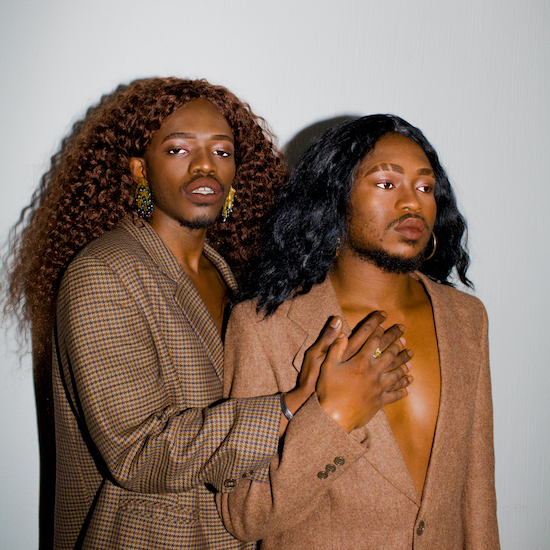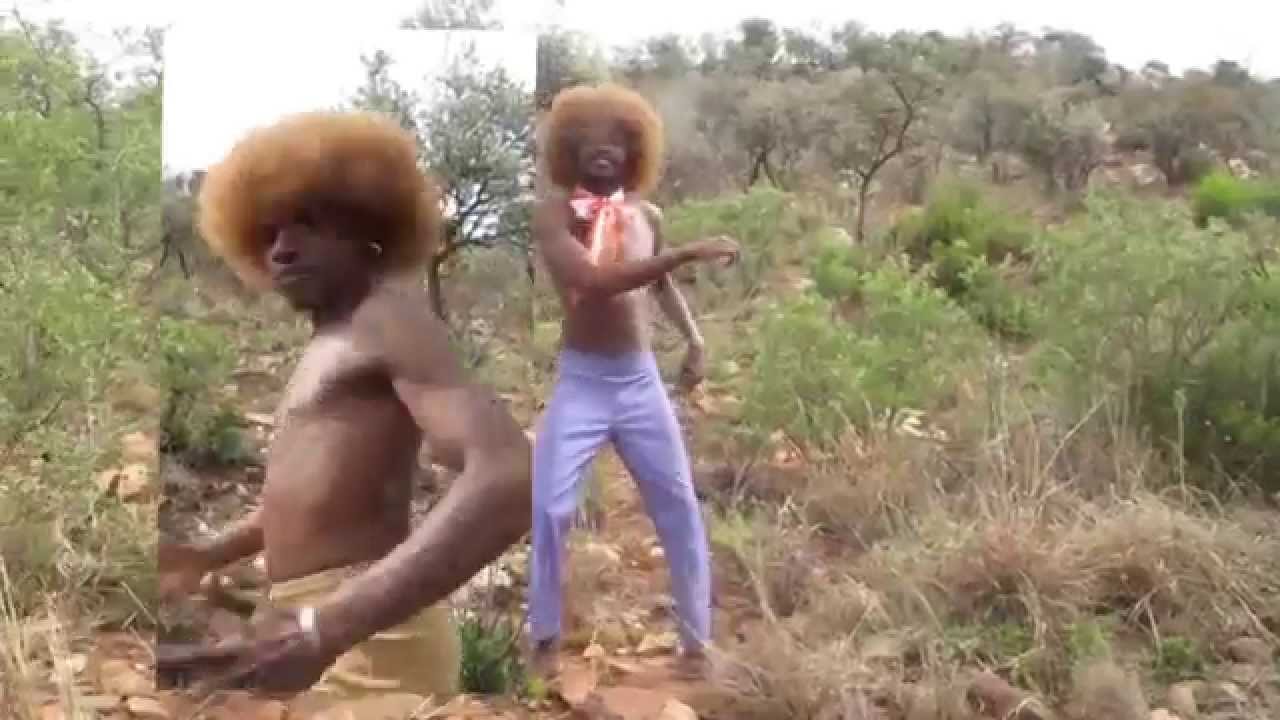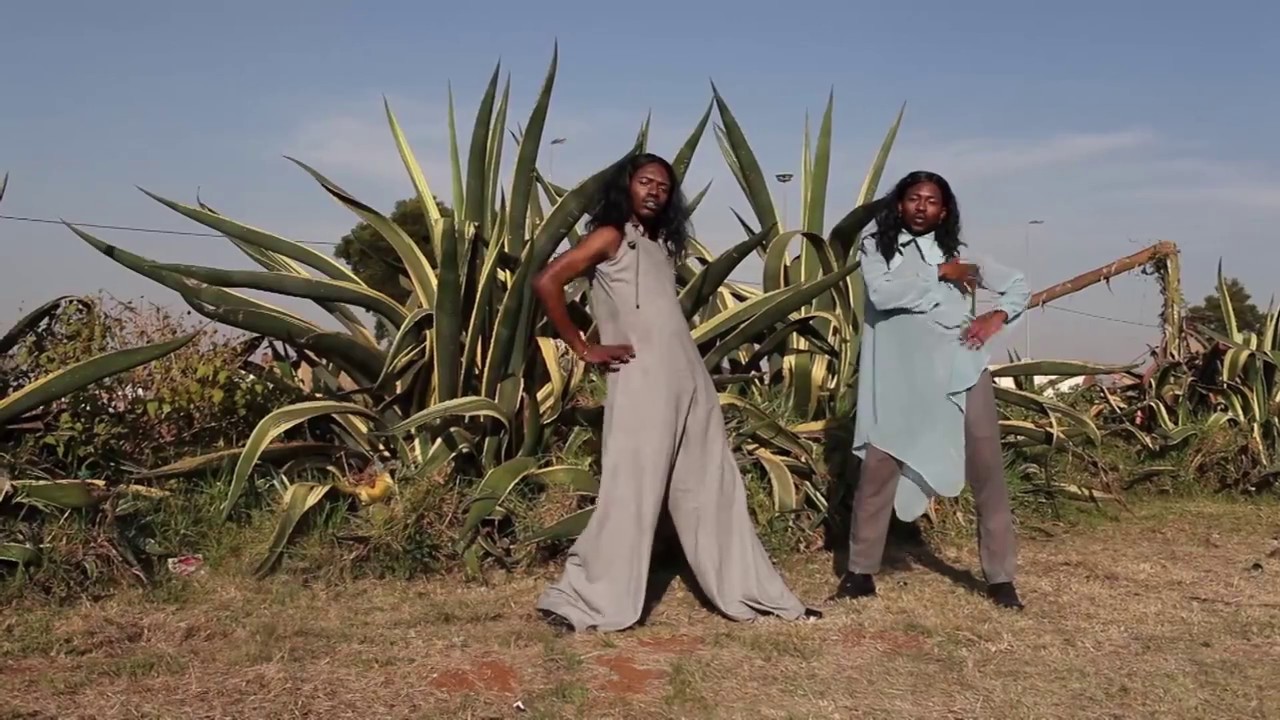Portrait by Amira_Moraloki
Two mesmerising creatures are voguing and pouting. Desire Marea and Fela Gucci are licking their lips, arching their backs, making sine waves with their naked torsos, to a soundtrack of stuttery percussive rhythms, in the middle of the dusty African wilderness. It was Faka’s ‘From a Distance’ video, the duo’s tribute to South African household name and afropop legend Brenda Fassie, that caught the eye of Mykki Blanco, who retweeted it and called it “Cute”. Like many, he’d fallen for the charms of Faka, a cultural movement established in 2015 by Fela Gucci and Desire Marea. Blanco went on to make his Out Of This World documentary with them, exploring South Africa’s queer scene, and celebrating some of the artists in Jo’burg, the country’s largest city.
Faka’s work involves live performance, music video, academic talks and hosting their queer club night, Cunty Power. Describing themselves as “a counter institution that is meant to shelter everybody who is alienated by mainstream culture”, their art explores post-apartheid masculinity, transphobia and modern African spiritualism. Their music is an intoxicating potion of gqom, pop, gospel and ancient rhythms, often danced out in a hyper-sexual blur of New York ballroom and ancestral African styles.
They’ve put out two EPs so far (Bottoms Revenge in 2016, and Amaqhawe last year), and been invited to perform at Milan Fashion Week, Unsound Poland and Berlin’s Biennale for Contemporary Art, to name a few. They’re about to head out on a European tour and have an album in the pipeline too.
Desire is fashionably late for our FaceTime chat and apologises for being “MIA”. He was shooting a new music video in Cape Town he explains, before staying on the phone for nearly two hours, talking trans-misogyny, Dynasty, Nelson Mandela and making out with straight men in gqom clubs.
What made you and Fela decide to start Faka?
Desire Marea: Growing up, there was no access to anything progressive or queer. Fela and I both grew up in quite isolated, rural places; me in KwaZulu-Natal and Fela in a township in the east. Those early stages were pretty traumatic, looking back. We were both very effeminate children. Our gender expression got us in danger. When you’re little you want to be as basic as possible. But we were strange, creative children. When I was around five, I used to like to wrap a sheet around my waist and walk out as if I was on a [catwalk]. My friends would cheer me on and scream. [laughs]
I didn’t see any queer role models on TV. I used to watch all the American soapies; The Bold And The Beautiful, Days Of Our Lives. I liked the glamour.
For me it was Dynasty and Dallas. Did you get those?
DM: [Gasps.] Dynasty. Amazing! We had Dallas but that just looked a bit boring to me. [Laughs] I actually got introduced to Dynasty through Paris Is Burning, which I only saw in 2012. Pepper Labeija was talking about it, and the wealth in white America and all that.
But I watched Paris Is Burning pretty late on. Stuff like that wasn’t easy to access. I remember growing up, and not liking Nelson Mandela after a relative told me that he reportedly said he didn’t like Boom Shaka – a kwaito group of four people who emerged straight after apartheid. There were two men and two women, but the females were the most prominent.
It was like hearing the most important human at the time, Nelson Mandela, not approving of what I thought was the most beautiful thing. He didn’t agree with the way they moved their bodies. He found it disruptive! I loved it! [Laughs] They were so cunty! It made people really uncomfortable to see us modelling ourselves on them. We were attracted to it. But we were taught it was wrong from an early age. I think all of that made it a bit more urgent for us to represent, and turn out our own black, queer narratives. Our work is about the liberation of the black queer body. So Fela and I met in 2010, put our first song on Soundcloud in 2013, and played our first live show in 2015.
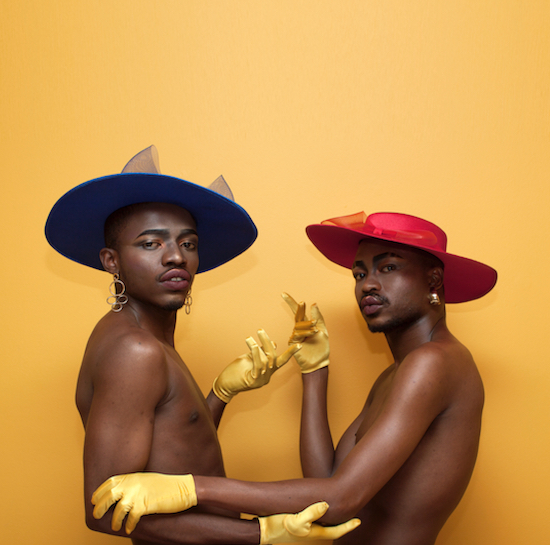
Portrait by Nick Widmer
Since then you’ve made music videos; presented talks on queer identity politics and race and class; hosted your own Cunty Power club nights, performed around Europe… What are the threads that run through what you do?
DM: We want to infiltrate mainstream spaces. The word Faka is Zulu for penetrate. It has the same sexual meaning, like in English. We want to infiltrate and occupy. And raise some of the complexities around queerness, which can’t be separated from race and class. A lot of gay figures on TV are very palatable and respectable. We see a lot of stereotypes that don’t reflect our own experiences of masculinity, and femininity. Being African, black and femme.
Of course, performing in mainstream spaces early on always turned out to be a violent experience. There was a lot of backlash, people would walk out, troll us on social media or make patronising remarks. It was confusing and made us question if we really wanted to do this. But it pushed us to host our own parties, make them inclusive, and create a safe place for trans and queer people. For people who relate to that desire for a better reality.
Our work also deals with sexual health, safe sex is a theme. Early on we made a logo that was a parody of the South African condom wrapper, Choice. A lot of people still don’t want to accept that men have sex with men. That shame kills people. There are men too ashamed to access public healthcare and HIV tests. And there are women in denial that their husbands and the father of their children might also be going to gay sex clubs.
Transphobia is something we wanted to address too. Fela and I couldn’t identify to the experience of being gay men; we didn’t belong in their world. There are very macho elements to cis gay culture. That’s a global thing. Trans misogyny speaks to the greater patriarchy in society. I can log in to Grindr in South Africa, or in Geneva, and 70% of those profiles will say “no femmes, no fags”. Queer erasure is another theme, and something we try to reverse by being visible and overtly queer. In our song ‘Uyang’khumbula’ for example, the lyrics go, “Do you remember me?/ We used to sleep on the sponge/ On other days we used to sleep in the bushes/ Another day your dad caught us eating each other in the kitchen from the morning til the afternoon”. It’s about childhood sexual experiences. Not a lot of people will speak about that. But we did stuff when we were aged six and seven with cishet men who don’t acknowledge us now. They pretend we don’t exist. Stuff like that was pretty common though.
Your lyrics are mostly in Zulu. Was it a deliberate decision not to translate them? Like an in-joke that most white people won’t get?
DM: Yeah absolutely, for a very long time we didn’t want to add subtitles. We wanted to remove that idea of imperialism. We enjoyed the idea of it being music only understood by our people. Although white people still love us! [laughs] Y’all book us! Y’all fuck with us!
How do you feel about white bookers or promoters wanting you to perform at their events? Do they feel like genuine allies, or does it ever feel exploitative?
DM: Honestly, it’s always felt very genuine. On a sonic level, a lot of European artists just got it. Our European audience grew faster than our South African one. We made connections with other people of colour too, progressive, experimental artists in the diaspora, like Chino Amobi in America, or Mykki. Those connections opened us up to a world where people receive music in a very genuine way. There’s quite an authentic curiosity about our music and an authentic engagement with it. Yeah sure, you can’t deny the slightly fetishistic element to having two black queer artists from Africa. Maybe some journalists wouldn’t engage with our work but would engage with our identity and exoticise or exploit that. But in the music communities we’re in, or the cultural spaces we perform in, like I say, it’s a genuine engagement.
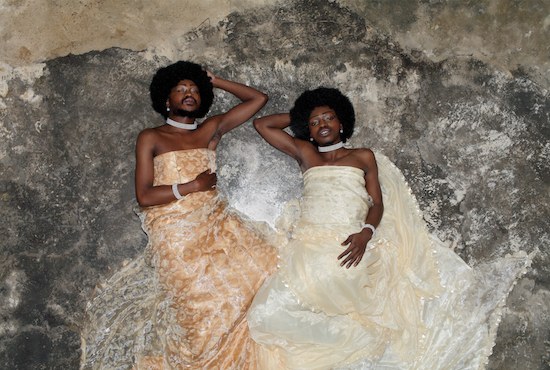
Portrait by Nick Widmer
Artists like DJ Lag from Durban have helped put gqom music on people’s radar, and take it out of the clubs and taxi cabs where it was first big, and introduce it to audiences outside South Africa. What you’re doing seems to be evolving gqom one step beyond that, and mixing it with gospel or pop and traditional African rhythms.
DM: Yeah, DJ Lag and artists like him were really responsible for that explosion in gqom, and giving it a bit of clout. Before it was seen as a poor man’s music. It wouldn’t get radio play. Middle class black people would say, “Turn that off!” It was invisible. Apart from in taxis or in clubs. A lot of the time gqom was simplified too; they made it all about partying. Partying is a huge element of it. And obviously gqom has strong associations with drugs and qoh [ecstasy] in particular. But there’s so much more to it. The gqom club experience was very rebellious, everyone was united. Everyone was going through the most complicated socio-economic circumstances. Gqom and the culture around it was quite therapeutic. Everyone was able to transcend. Everyone had access to that experience. It was unifying. It also unified alternative sexualities that were not otherwise in the mainstream club scene. I mean, Fela and I would make out with guys, straight guys. It was very homoerotic, lots of men dancing with men. Everyone was so free. That’s an element of gqom that’s rarely spoken about. There was a queerness that’s hard to deny. We always felt safe. A huge element of that might have been the ecstasy. The style of repetitive vocals is made to mimic being high on ecstasy.
What makes gqom so special is that it’s successful and it’s indigenous to South Africa. It’s pioneered by young, black people from disadvantaged backgrounds. For us, it’s the evolution of black spiritual music. We mix African music with Western influences, American culture is very big in our society if I’m being honest. There’s a spirituality to gqom too. The word gqom literally means drum. It’s percussive. The drum has been a consistent element in spiritual music. For us it goes back to diviners summoning spirits with drums. So I guess we’re reclaiming our own spiritualism. We’re making our own modern spiritual music.
The influence of gospel is very strong in our music too. My grandfather was a pastor and I was raised a Catholic. My first musical experience was in the church, that choral sound. We’ve since rebuked the idea of Christian religion because we didn’t feel it included us.
Your music also seems inextricably wrapped up with your activism. I read somewhere that Fela doesn’t like what you do being described as brave; when you’re just being honest. Can you explain a bit more what he meant by that? Does the word seem patronising?
DM: For me, I shy away from the word brave. I wouldn’t deny that what we do is provocative. Or that what we do puts us in danger. In our videos we’re going into the wilderness, set up with these backdrops of typical African scenery and performing the sassiness, the vulnerabilities, the delicacies, in those settings. That’s our way of subverting masculinity. But the word brave, to me feels like a very cold kind of refusal to be vulnerable. Growing up as boys, we were told to be brave, not to cry.
What we do is about not denying all the things we love. Or feeling pressure to be a certain way. We hate capitalism. And we love beauty. For us, to be active is an act of love. We will never want to erase love or vulnerability from our activism.
There are other activists who have a lot of rage and aggression, which is very valid, very relatable. You need that. People champion the fight. Not all of us can clapback though. When someone is being racist, sometimes you want to shrivel up and be quiet, and deal with that later. It doesn’t mean we are weak. I guess we just have our own ways of being militant, darling.
FAKA perform live on Saturday April 7 as part of Rewire 2018 in the Hague, NL

